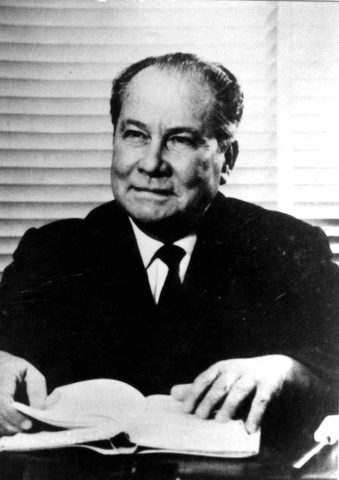
Carlos Monge Alfaro (Cartago, May 22, 1909 – San José, April 8, 1979) was an educator, writer, essayist, historian, geographer, politician, and Costa Rican philosopher. He was one of the founders of the University of Costa Rica, of which he was subsequently its rector in three periods. He was also part of the Constituent Assembly that formulated the current Political Constitution of Costa Rica of 1949 after the Civil War of 1948. He was declared Benemérito de la Patria (With Great Merit for the Fatherland) in 1980 by the National Legislative Assembly.
Son of the marriage formed by Ulpiano Monge and Gloria Alfaro, his family lived in the Cervantes District in the Province of Cartago. His Secondary Education was carried out at the Liceo de Costa Rica graduating with the Bachelor of Arts and Science degree in 1926. He continued his Higher Education studies that led him to graduate with honors as a professor in History, Geography and Civic Education at the University of Chile and the University of Costa Rica obtaining an academic degree in the Faculty of Philosophy and Education. He was one of the members of the Center for the Study of National Problems with Rodrigo Facio Brenes, Daniel Oduber Quirós and Isaac Felipe Azofeifa, among others.
Carlos Monge Alfaro always had in his thought that education was a service to others so that with his policy, the university would be at the service of society especially among young people. Subsequently, from the legacy of the Old University of Santo Tomás, he began in 1939 the project for the creation of the New University of Costa Rica (UCR) in conjunction with León Pacheco Solano and Isaac Felipe Azofeifa. The proposal was presented to the Minister of Public Education Luis Demetrio Tinoco Castro who presented the project to the Constitutional Congress on June 15, 1940, approved two months later, opening the way to Law 362 called Organic Law of the University of Costa Rica for the Creation of the UCR and the signature was formalized on August 26, 1940.
Carlos Monge had a great influence on the development of the University, he was engaged in academic policy, extension and the search for notable advice, for this reason in 1949 he presented to the University Council a Curriculum with the idea of creating a cycle of general studies with specialization in fields such as Philology, History, Physics, and Mathematical Sciences, Biological Sciences, Chemistry, Education and Ph.D., while also in this period the UCR expanded the academic sector and infrastructure.
At the University of Costa Rica, he was dean of the Faculty of Philosophy and Language from 1948 to 1953, Secretary-General and Rector in the period from 1961 to 1970. Although Monge was rector of the UCR on three occasions: 1961-1964, 1964-1967, 1967-1970, he was also a professor at the Colegio Superior de Señoritas from 1943 to 1949, professor of History and Geography at the Liceo de Costa Rica from 1934 to 1938 and a professor at the Seminary College in 1942.
He was also a member of the Academy of Geography and History and participated in the National Association of Educators, assuming the position of Secretary in two periods from 1943-1944 and from 1944 to 1945, in the Central American University Superior Council; also, in the National Liberation Party in the 1940s, vice president of the Latin American University Union, President of the Social Democratic Party of 1945-1950 (Costa Rican party formed in the 1940s and of socialist ideology), author of the exhibition of reasons for the Basic Law of Education of Costa Rica, in which he participated as co-editor of this project and integrated the University Council of the National University.
The work he did as a journalist for the Diario de Costa Rica ranged from 1938 to 1945. The country was in a considerable demographic increase when perceiving this national problem, the rector Carlos Monge had two ideas to diversify education, such as the creation of a technological institute to provide opportunities for society in education, so he chose to present the project in 1967 to expand education into other areas of the country and together with Alfonso Carro and Ovidio Soto, they presented the project on January 12, 1968, to the University Council, so that the UCR Regional Centers were created in Liberia and San Ramón in March of that same year. Carlos Monge Alfaro was declared Benemérito (With Great Merit) for Education on June 16, 1980, two months after his death. The library of the University of Costa Rica bears his name.
Published work. In its vast publication of works, the following stand out:
- Our History and Insurance.
- From Feudalism to Capitalism.
- Costa Rican History.
- History of Civilization.
- Costa Rica Geography Lessons.
- Chilean Democracy and the American Perspective in the 19th Century.
- University and History.
- The Forge Education of a Democracy.

